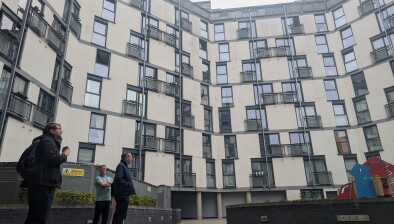Scottish housing providers have ‘once in a lifetime’ chance to spearhead low-carbon future
Jillian Edmund
Heat networks, which deliver warmth to entire buildings or estates from a central source, are fast becoming a key part of the UK’s energy transition. Advice Direct Scotland says housing associations and local authorities can be champions of cleaner, more efficient heating with the right support, guidance and awareness.
Jillian Edmund, heat network expert at Advice Direct Scotland which runs energyadvice.scot, said: “There’s huge potential here. Once providers understand what heat networks are and how they fit into the bigger picture, they can unlock real benefits for their communities.
“By understanding how heat networks work and what they offer, housing providers can improve energy performance, engage residents more effectively and play a leading role in the journey to Net Zero.
“With education and support, housing bodies can become active leaders in the energy transition. Clear guidance, practical training and accessible resources can help housing providers understand what heat networks are, how they function, and why they matter.”
In April, Advice Direct Scotland became the national consumer advice agency for heat network users in Scotland.
She added: “We need to demystify heat networks, unveil the wider benefits in terms of jobs and make sure they’re not invisible to the very people who rely on them.”
Last month, the Edinburgh Climate Change Institute (ECCI) said that low-carbon heat networks and energy-efficiency upgrades across Edinburgh, Midlothian and East Lothian could generate up to £2.1bn in environmental and social benefits over the next 25 years.
In May, parts of Inverness were earmarked as promising sites for the development of large-scale heat networks. In response to a nationwide initiative, Highland Council, alongside other local authorities across Scotland, has been tasked by the Scottish Government with crafting strategies to boost energy efficiency and reduce carbon emissions.
A report presented to Highland Council’s Climate Change Committee highlights several key areas in Inverness - namely the west bank of the River Ness, the city centre, Longman, and Raigmore - as potential hubs for these networks.
The proposed systems could draw heat from a variety of renewable sources, including ambient air, groundwater and even the earth itself. Other possibilities include biomass, hydrogen, and cutting-edge technologies that recover thermal energy from wastewater such as the warm water households send down their drains.
Heat network consumers can access direct support through Advice Direct Scotland either via energyadvice.scot or through the helpline 0808 196 8660. The service already provides consumers with support and advice related to energy issues including billing, affordability and energy efficiency.
Since April, consumers in vulnerable circumstances can be referred by Advice Direct Scotland to the Extra Help Unit (EHU) at Citizens Advice Scotland for additional support.
Both organisations are funded by Consumer Scotland – the new statutory advocacy body for heat network customers in Scotland – to carry out this work.







